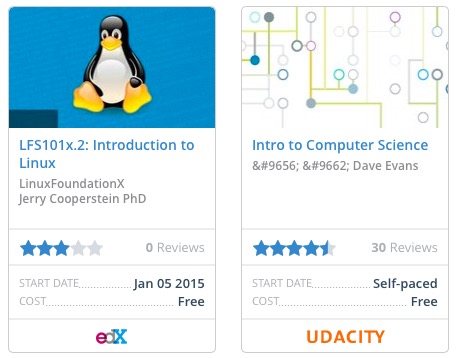THE BEST AND THE WORST OF ONLINE LEARNING
by Richard White
2014-12-25
A few months ago I signed up to take my fourth Massive Open Online Course (MOOC). We’ve discussed MOOCs here before, but it’s been awhile since I’d taken one, so perhaps it’s time for an update.
My track record with regard to these MOOCs is better than that of most people. The first one I took, a Python-based course on Building a Search Engine offered by Udacity, was far and away the best one I took. The whole MOOC craze hadn’t really started yet, and so it was clear that the instructors wanted to get this right, and that fact showed in the time and care they took in developing both the curriculum and the materials used to support the course. I followed the course, completed assignments as required, and earned a “certificate of completion” at the end of it all. Based on my experiences with that single course, I became a true believer in the concept of MOOCs.
I signed up for a couple of other classes over the course of the next couple of years, but didn’t complete either one. Udacity’s follow-up CS212 course, Programming Principles, taught by Peter Norvig, was poorly organized and poorly delivered, a disappointment all the more striking on the heels of the first course. Based on comments left on the course Discussion Board, students abandoned the course in droves. (Here’s an online review from a student as well.) I left my own comments on the Udacity Discussion Board:
…One of the important tenets of education is the idea of giving as student a problem that is just beyond their current level of understanding, along with the tools he or she needs to make that next step. In CS212, in the first unit, just about every quiz solution reveals a strategy or technique that had never been broached in the discussion to that point.
Yes, I understand that “the real world” requires one to do independent research as required. This is not “the real world”–this is an educational course that is intended to guide me in discovering the tools that I can use to solve problems. CS212, in that regard, has been a bit of a disappointment.
The third course I took was again offered by Udacity, this time a Java-based Intro to Programming course that I quite liked. It had the benefit of being taught by the author of the textbook I use for the AP Computer Science course I teach, and it was entertaining for me to hear his audio- and video-recorded development of topics that I would be teaching myself. I didn’t complete this course because I got busy prepping for school, and that seems to be a common malady when it comes to MOOCs. Without the structure offered by a regularly-timed class, there is an enormous attrition rate.
Just a few days ago, I completed the second of the four MOOCs I’ve taken, this one an Introduction to Linux offered by edX. I finished the course–a PDF certifying that fact is being readied as we speak!–but I can’t say it was a pleasant experience.
Here’s the thing. Learning is hard, and teaching is even harder. You’ve got to help students develop a coherent picture of the content and process that you’re presenting, typically with explanatory comments to help them understand why something is the way it is.
Here’s the type of video I got in this most recent course.
This is not teaching.
I survived the course only because a) I already knew most of the material in it, and b) the “final exam” consisted of 30 Multiple Choice questions, open notes and open coursework, with two tries allowed for each question and a pass-fail cutoff at 70%.
MOOCs aren’t going to go away. With a lot of planning and forethought, it’s possible to do them well. It’s also extraordinarily easy to mess this up, and it’s going to take some time for things to settle out. There are lots of challenges to be solved. How to reliably deliver good content? How to accurately gauge students’ progress? How to certify completion/mastery?
We’e seen some interesting forays into this new area of learning, and we’ve seen the ensuing land-grab by various corporations and higher-ed institutions, and the backlash that resulted from trying too much, too soon. We’ll see within a few years what we’ve decided to make of all this.
In the meantime, feel free to try out a MOOC and see how it feels. If at all possible, see if you can determine in advance how well a given course works. Coursetalk.com may be one place to start.
Good luck… and I’ll see you online.
